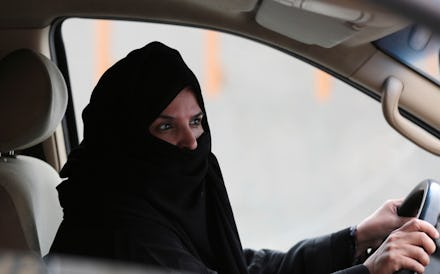Saudi women gained the right to drive. Let’s not dismiss how historic that is.

In a televised reading of a royal decree in Saudi Arabia and in Washington, D.C., Saudi leaders announced Tuesday that as of June 2018, women would be granted the right to drive. The decision follows years of international criticism and the work of women activists in Saudi Arabia who have protested the Draconian law.
The first protest against the ban on driving was in 1990: 47 women took to the streets, literally, in their cars. All of them were arrested; the women and their husbands were banned from foreign travel. Some lost their jobs or were mocked and blamed by clerics who claimed these women would lead to the demise of Saudi society. The cost for protesting was high, but women kept at it. In 2008, Wajeha al-Huwaider posted a video on YouTube of herself driving. In 2011, Manal al-Sharif coordinated an action for women to drive on June 17 of the same year.
But not everyone was unequivocally celebrating Tuesday’s announcement.
It is perhaps unsurprising that Paul Joseph Watson, editor-at-large of Infowars, is making jokes at the expense of Saudi women. But jokes aside, it is probably hard for most Americans to believe — given women’s mobility in the United States — that in 2017 women in Saudi Arabia just gained the right to drive. But ignoring how historic and momentous this is for Saudi women erases the life-risking efforts of women who helped the country make this step on the long path to gender equality.
It also obscures how Western nations have turned a blind eye to the treatment of women in Saudi Arabia, which goes well beyond the right to drive. Much of Saudi women’s autonomous decision-making ability is given to a male guardian. This includes the right to marry or divorce or keep their children post-divorce. They can only appear in public with a full body and head covering. They can’t eat at restaurants alone, they can’t mingle or socialize with men they are not related to and the list goes on. Saudi Arabia has one of the strictest interpretations of Sharia law in the Middle East.
But, while some conservative voices are vocal about the condition of women’s rights in the Middle East, many Republicans have facilitated the decadeslong relationship with the kingdom. And many of those Republicans are the same conservatives that wield wars in the United States against women’s rights. It’s easy to point out that a movement restriction is objectively sexist and abusive to women. It appears to be less obvious to conservatives when they are working to overturn access to abortion, restrict women’s access to health care or to decide appropriate recourse for sexual assault, how those conditions also hurt women.
We should hesitate to compare and contrast conditions for women globally: There are differing cultural norms and material realities that make those types of comparisons difficult. For example, many women in the world probably can’t afford a car, but that doesn’t make Saudi Arabia’s win any less important.
Similarly, feminist activism doesn’t look the same everywhere. American feminists may be focused on pay equity or access to abortion; women in Saudi Arabia have been focused on driving (among other things). In India, they might be focused on the high instances of gang rape, and in Afghanistan, many are fighting for the right to pray alongside men, have access to education and or even access clean drinking water.
There is no universal face of misogyny; every culture has a profoundly different and insidious interpretation. And making broad generalizations about how it is better here versus somewhere else does women no favors. Conservatives can sit on their high horses about how say, in America, women have always had the right to drive. But the toxic misogyny that allows for a driving ban has, at its core, the same fundamentalist idea about women’s choices that dictate those policies in less obvious ways.